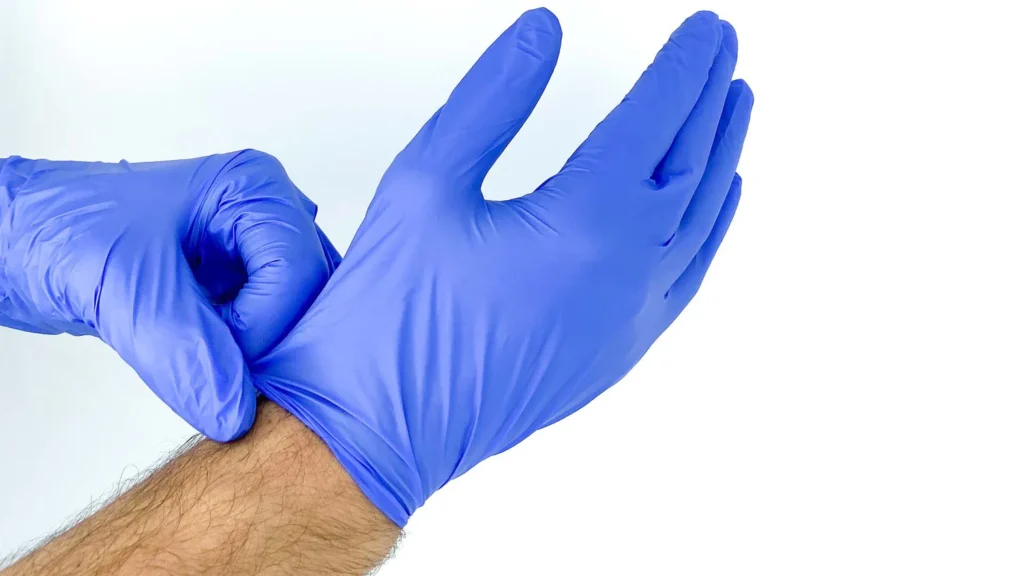In a world filled with hazards, ensuring safety while handling chemicals is paramount. Whether you’re working in a lab, a medical facility, or even at home, protecting your hands from harmful substances is crucial. This is where nitrile glove come into play. They offer a robust shield against chemical exposure and are essential for anyone dealing with hazardous materials. In this blog post, we’ll explore the role of nitrile gloves in safeguarding against chemical exposure, providing insights into their effectiveness, benefits, and proper usage.
Understanding the Basics of Nitrile Gloves
Nitrile gloves have become a staple in many industries, and for good reason. Made from synthetic rubber, these gloves are known for their excellent resistance to chemicals, oils, and acids. Nitrile gloves are highly durable and provide a reliable barrier against a wide range of substances. Unlike latex gloves, nitrile gloves are latex-free, making them a safe choice for individuals with latex allergies. Their popularity continues to grow in various sectors due to their versatility and protective capabilities.
Chemical Resistance of Nitrile Gloves
One of the primary reasons nitrile gloves are favored in industries dealing with chemicals is their exceptional resistance to chemical exposure. Nitrile gloves are designed to resist a broad spectrum of chemicals, including solvents, oils, greases, and certain acids. This resistance is a key feature that makes them suitable for use in laboratories, manufacturing facilities, and cleaning operations. The gloves act as a barrier, preventing harmful chemicals from coming into direct contact with the skin.
Ensuring Comfort and Dexterity
While protection is paramount, comfort and dexterity are also crucial when choosing gloves for any task. Nitrile gloves excel in this regard. They are designed to fit snugly, ensuring ease of movement and flexibility. This is particularly important when performing delicate tasks that require precision. The comfortable fit of nitrile gloves ensures that users can wear them for extended periods without discomfort, making them suitable for long work shifts.
Advantages Over Other Glove Materials
Nitrile gloves offer several advantages over other glove materials, making them a preferred choice for many professionals. Unlike latex gloves, nitrile gloves do not cause allergic reactions, eliminating a significant concern for users. Additionally, nitrile gloves are more puncture-resistant than latex gloves, providing an added layer of protection against accidental tears or breaks. This durability ensures that the gloves remain intact even when handling sharp objects or abrasive materials.
Applications Across Various Industries
The versatility of nitrile gloves makes them indispensable across a wide range of industries. In healthcare settings, they are used to protect both healthcare professionals and patients from cross-contamination. Laboratories rely on nitrile gloves to safeguard against chemical exposure during experiments. In the automotive and manufacturing industries, nitrile gloves protect workers from oils, greases, and other hazardous substances. Even in household cleaning, nitrile gloves offer protection against cleaning agents and chemicals.
Proper Usage and Disposal
To maximize the effectiveness of nitrile gloves, it is essential to use them correctly. Before wearing the gloves, ensure that your hands are clean and dry. Check the gloves for any signs of damage, such as tears or punctures, before use. When removing the gloves, do so carefully to avoid contact with any contaminants on the glove surface. Proper disposal is equally important; discard used gloves in designated waste containers to prevent contamination.
Environmental Considerations
While nitrile gloves provide excellent protection, it’s important to be mindful of their environmental impact. Nitrile gloves are made from synthetic materials, which means they are not biodegradable like natural rubber latex. However, advancements in technology are leading to the development of more environmentally friendly options. Some manufacturers are producing nitrile gloves that are biodegradable, offering a sustainable solution without compromising on protection.
Choosing the Right Nitrile Gloves
Selecting the right nitrile gloves for your specific needs is crucial. Consider the type of chemicals you’ll be handling and choose gloves with the appropriate level of chemical resistance. Thickness and length are also factors to consider, as they determine the level of protection provided. For tasks requiring precision, opt for thinner gloves that offer greater dexterity. Always ensure that the gloves are certified and meet industry standards for safety and quality.
The Role of Nitrile Gloves in COVID-19 Protection
In addition to chemical exposure, nitrile gloves have played a significant role in the fight against COVID-19. Healthcare workers and frontline responders rely on nitrile gloves to protect themselves and prevent the spread of the virus. The pandemic has highlighted the importance of personal protective equipment, with nitrile gloves being a vital component of PPE kits used worldwide. Their effectiveness in minimizing contact with potentially contaminated surfaces makes them indispensable in efforts to curb the virus’s transmission.
Continuous Advancements in Nitrile Glove Technology
Advancements in technology continue to enhance the performance of nitrile gloves. Manufacturers are constantly innovating to improve glove design, making them more comfortable, durable, and effective. New formulations are being developed to provide increased chemical resistance and prolonged wear time. These innovations are driven by the need to meet the evolving demands of various industries and provide top-notch protection for users.
A Final Thought on Nitrile Gloves and Safety
Nitrile gloves are an essential tool for anyone handling chemicals, whether in a professional setting or at home. Their chemical resistance, durability, and comfort make them a reliable choice for protecting against chemical exposure. By choosing the right nitrile gloves and using them correctly, you can ensure a safer work environment and minimize the risk of harm.
Taking Action for Enhanced Safety
In conclusion, nitrile gloves play a crucial role in safeguarding against chemical exposure. Their versatility and protective qualities make them a valuable asset in various industries. Whether you’re a healthcare professional, a laboratory technician, or someone handling chemicals at home, investing in high-quality nitrile gloves is a proactive step toward ensuring your safety.
Remember, safety should always be a priority. Equip yourself with the right tools, stay informed about best practices, and remain vigilant when handling hazardous materials. By doing so, you’ll be well-prepared to tackle any task with confidence, knowing that you’ve taken the necessary precautions to protect yourself and those around you.
For further information on selecting the right nitrile gloves for your specific needs, consult with experts in personal protective equipment. Stay updated on industry trends and advancements to make informed decisions regarding your safety gear. Together, we can create safer environments and continue to prioritize the well-being of individuals in every setting.






